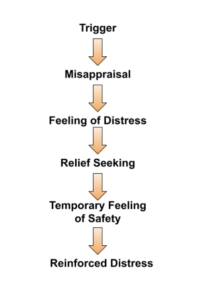
“I feel like I really love my baby, but, I just don’t know. I have these terrible thoughts that pop into my mind. Thoughts of harming my baby. I actually vomited last night it made me so upset. I don’t know why I’m having these”
“Everyone around me, including my pastor, seems to think I have a really strong faith. But I wonder if I just really have everyone tricked. I mean, it’s not like I disagree with them on paper, but I just don’t feel it. Doubts as to my faith in God pass through my mind, and though I don’t want to believe them, ‘you are what you think’, right?
“So often I’m just minding my own business, and I feel like I get these almost sexual urges out of nowhere. I can’t even define them, but sometimes it’s a thought, other times it’s an image, and it’s always this feeling like an urge to do something really bad, though I hate it, to go do something I shouldn’t.”
Pause.
What were your initial thoughts when you read each of these? Did you think they reflected something deeper? A problem? Relate to them? Scared by them?
In actuality, These are short examples of Intrusive Thoughts. Or as many of us like to say in the Anxiety specialty world, just…”thoughts.”
What are intrusive thoughts?
Intrusive Thoughts are, at a basic level, just like the phrase implies: thoughts that are unwanted, pressing into awareness but seemingly out of context. Basically everyone has them; research indicates that around 94% – 99.4% of people endorse experiencing such intrusions.
Clark and Ryhno (2005) define “unwanted clinically relevant intrusive thoughts, images or impulses as any distinct, identifiable cognitive event that is unwanted, unintended, and recurrent. It interrupts the flow of thought, interferes in task performance, is associated with negative affect, and is difficult to control.” Some unfortunate souls are more plagued with them, like in disorders such as Obsessive Compulsive Disorder (OCD), Generalized Anxiety Disorder (GAD), and Post-Traumatic Stress Disorder (PTSD). It’s clearly not limited to these disorders (it happens in Major Depression, too), nor is it limited to those who have disorders.
One of the key measures (IITIS) in studying intrusive thoughts categorizes 7 content domains:
- religious/immoral
- victimization
- sexual
- doubt
- contamination
- harm/injury/aggression
- ‘other’ intrusions
What Kind of Thoughts Have YOU Had?
If you haven’t noticed having these types of thoughts, I’m grateful you haven’t had to! For those who struggle to make heads from tails with one of these, you are not alone. If it has gone so far as to impact your daily functioning, there is hope.
Jonathan’s Story
Jonathan has a lot of social fears, and almost constantly worries that he’ll be negatively evaluated, judged, or will embarrass himself. These concerns are classic social anxiety. But he also gets intrusive thoughts about these social interactions. Sometimes he has a thought like, ” What if I grab her butt?” He is mortified, to say the least, that he has these thoughts. Other times, he has intrusions along the lines of, “What if I blurt out sensitive information that I’m not supposed to share- something another person has trusted me with or sensitive bank or identity information?” He’ll even get “classic” harm intrusions, such as when holding sharp objects in his hands, he’ll get an occasional visual in his mind of stabbing someone.
If you wonder if Jonathan has some violent, impulse issues and needs to deal with these inappropriate urges, he thought just like you. In fact, he spent over a decade addressing these things as if they were ego-syntonic (i.e., originating from his desires). This actually led to more problems for him- anxiety, constant confessing to others and seeking reassurance, and driving away his former fiancé and some friends.
The reality for Jonathan was that he was just experiencing something very normal in human functioning. It was very relieving to know that all sorts of thoughts come into the mind at different points. Maybe it’s thinking about a random word like banana or something that feels more charged such as ‘murderer.’ For those of us paying attention, most of us will have a little bit of both.
The Problem With Judging Incorrectly
The problem with only having a little bit of information or jumping to conclusions is precisely that- that we only have a little information or are jumping to conclusions. Be careful in not doing this with yourself- or others. It’s a key aspect of the Christian walk- Jesus gives us exhortations to look at the heart (see the “Sermon on the Mount” in the Bible). He also says at times not to judge (in that same sermon), and yet at other times to judge with right judgment (John 7:24 in the Bible).
It is an unfortunately common experience that I talk with people every week who:
- misunderstood in themselves their thoughts and/or
- were misunderstood by others when experiencing intrusive thoughts and/or
- misunderstand other people’s expressed thoughts.
Some of the stories break my heart:
- family members created distance because they were scared of shared intrusive thoughts
- CPS investigations on false information
- Psychiatric hospital holds or admissions
As a specialist with these types of things, my converse experience is joy in helping gain clarity- as a person who has struggled with intrusive thoughts and as a person who treats them clinically.
The Church and False Judgment
It’s also time we admit that the church has often jumped to conclusions and makes judgments on a little bit of information, rather than the whole context. Pastors, leaders, and/or church members need to slow down to listen more. Ask questions. Refer to someone who can work with such things when you don’t know what to do. But people in the church are just people, too. There is grace for everyone who asks God.
C.S. Lewis had notably commented on the problems in seeing the Devil in everything and nothing:
“There are two equal and opposite errors into which our race can fall about the devils. One is to disbelieve in their existence. The other is to believe, and to feel an excessive and unhealthy interest in them.” (Screwtape Letters, 1942)
The balance that is hard to strike is living in a physical and spiritual world, not always knowing what is what, or how to respond.
How To Find Freedom From Intrusions
If you are a person who suffers in some way because of intrusive thoughts,
- becoming aware of them and how you respond to them is the ultimate first step- no movement can personally be made until you bring light to your situation. Talking with a trusted other, reading more on the topic (such as my blog), or seeing a therapist trained in working with intrusive thoughts (usually CBT, sometimes also helpful is Exposure Therapy).
Here are core steps to finding freedom from intrusive thoughts:
- Assessing your situation. Once you shine the light of day on what kind of thoughts you are experiencing, addressing them requires understanding not only when/how they come up, but especially assessing how you respond. By and large, intrusions are ego-dystonic (i.e., against one’s wishes). However, you might need a little more help assessing thoughts that involve a mix of wanted/unwanted, like in Addiction, lust, or anger. It is possible to have thoughts that need to be treated from both a wanted and unwanted standpoint. (E.G. “I hate this craving I have for alcohol, but I’m also an alcoholic.”)
- Identify the problematic response. If you have a thought that doesn’t need credit given to it, you reinforce it by giving it credit. For a person who has intrusive thoughts but no struggles around alcohol, they might avoid the wine section in a store so that they’re not “tempted.” This will likely reinforce their fear and focus on wine. This is a basic model of maintenance of anxiety/distress:

- Once you know the reactions you want to change, practice, practice, practice NOT reacting. Practice responding with what you value and believe. Not only during game-time, but outside of:
- Start small, but you can take the word/phrase that is distressing and write it on paper (exposure script). You might add to it and build it out so you can look at fear head-on, and practice not giving into your fear (varies from person to person, but could be avoidance, checking, reassurance, washing, etc.).
- For example, if you get a sudden intrusion that you should “pound” a liter of vodka (and your history doesn’t indicate you have problems with that), notice the thought, stay present with where you are (maybe getting your groceries), and talk back to the fear by diffusing and accepting the thought: “uh huh, sure.”
Thoughts are Thoughts
If you recall, I said that Anxiety specialists like to refer to Intrusive thoughts as just “thoughts.” Thoughts are thoughts. Feelings are feelings. Just because we have a thought doesn’t mean there’s some deep meaning to it, unless it does. Learning to differentiate between our thoughts and to choose our attitudes is a core aspect of well-being. I hope if you have intrusive thoughts that you will receive God’s love for you, learn to identify what’s true, and learning to act on what is important. For those who still don’t understand the challenges that exist for those suffering, I hope you will walk in loving your neighbor as yourself- as if you did understand. We don’t have to “get it” to get it– meaning, we can still choose to love and be loved even when we don’t understand.
All names and details used are obscured to protect patient confidentiality, including using a mixture of case information. The article is intended for educational purposes and should never be substituted as treatment or in place of a clinician’s recommendations for you.








Leave a Reply